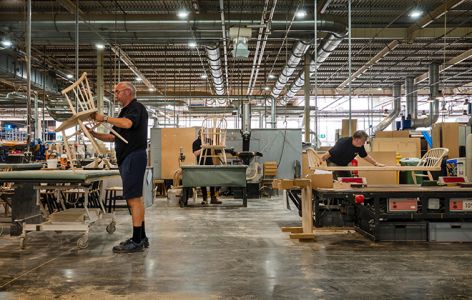- By Buckinghamshire Business First
- 8 February, 2023

Share by email
Businesses in Buckinghamshire have a unique chance to improve the strength and depth of the local skills and labour markets across key sectors and skillsets.
Together, through the Local Skills Improvement Plan (LSIP), we can align local skills needs with local skills training.
Businesses are already getting involved – join them and make your mark!
Calling all Bucks-based Digital businesses
We are inviting representatives from the Digital Sector in Buckinghamshire to join us for the next stage of consultation on the Local Skills Improvement Plan (LSIP) for the county.
The Digital Sector has been designated as a priority sector for Buckinghamshire and this meeting will bring together employers and training providers to agree on skills priorities for the Digital Sector and explore the solutions with education and training providers.
This free event is on March 23rd and will be hosted by SAS UK, home of Buckinghamshire's Analytics Software and Solutions. It will include a light lunch along with refreshments.
Calling all Bucks-based training providers
We are inviting representatives from the Training Provider sector in Buckinghamshire to join us and local employers to agree on skills priorities for the sector and to explore the solutions.
We are specifically interested in hearing from training providers of post-16 technical education and training.
This free event is on March 22nd at Westcott Venture Park.
The background
You will be hearing a lot in the coming months about the Local Skills Improvement Plan (LSIP) for Buckinghamshire, and we wanted to tell you all about it, what the benefits of it are, and how you and your business can play a part in it.
In 2022, Buckinghamshire Business First was designated as the Employer Representative Body (ERB) for skills in Buckinghamshire.
Selected by the Department for Education (DfE), we were chosen to lead a plan that will truly address the local skills shortages that are keenly felt by employers across the county.
What does an Employer Representative Body do?
ERB status means that we are responsible for leading on the research, development and production of a Local Skills Improvement Plan (LSIP) for Buckinghamshire.
We are doing this by working in close collaboration with local employers, training providers and other stakeholders.
Together, we are identifying the key changes needed to make sure post-16 technical education and training fits in with local employer and labour market needs.
The LSIP is funded by the Department for Education, and a Local Skills Improvement Fund will be introduced in 2023/24 through which providers can implement the changes suggested by the LSIP.
What BBF has been doing
Buckinghamshire Business First has been hosting a series of online employer briefing events designed as initial introductions to the LSIP, the background to selecting the priority sectors and themes, and an overview of exactly how employers can engage with the process.
The first of these employer briefings took place on January 11th, focusing on the Film & TV sector. This event, which was facilitated by All Spring Media, brought together Buckinghamshire-based businesses and representatives from the BBC, Amazon and Disney to begin the work of aligning local skills needs with local skills training.
Subsequent employer briefings have taken place for the construction, engineering and digital sectors, as well as a briefing event for training providers.
These events have been invaluable for drawing out the key issues for each sector, as well as issues that cut across all sectors.
What's next?
We are reaching the end of the first stage of the 3-stage process for the Local Skills Improvement Plan.
The next step involves brining employers and training providers together to work on solutions to the challenges identified (see below for more details).
What are the issues emerging from conversations with employers?
The following are among the challenges and issues highlighted:
Film & TV
- A lack of experienced people in key technical roles in both production and post-production
- Lack of clear entry points for people to pursue careers in the sector
Construction
- General need to attract more people to the sector
- Key issues with management and project management skills
- The need for more digital literacy
- Some key areas lacking, such as heat pump installation and maintenance
Engineering
- Immediate need for mechanical and electrical engineering programmes at further and higher education
- Basic engineering skills missing amongst education leavers
- Lack of apprenticeship and training provision
- Not enough young people choosing engineering as a career
- Poor work-readiness amongst education leavers
Digital
- Key shortage of software and web developers
- Poor basic digital literacy amongst education leavers
- Poor work-readiness amongst education leavers
Health and Social Care
- The need for key skills amongst new entrants to the sector, including communication, teamwork and problem solving
- A widespread wrong impression of what a career in the sector is like
- Digital literacy
Green: Net Zero
- Employers are generally not focusing on Net Zero, so it will become a key issue in the near future
- Skills for monitoring and measuring the drive to Net Zero
Digital literacy
- All businesses identifying skills gaps amongst new entrants and existing employees
- Skills needs are now significantly ahead of desktop and social media capabilities, with many jobs needing an appreciation of data management and collaboration tools
Want to get involved?
To get involved with the work that BBF and other stakeholders are doing around skills in Buckinghamshire, contact John Browning, Local Skills Improvement Plan Manager, for more information:
- call 01296 798774
- email [email protected]
Your business is at the heart of the Local Skills Improvement Plan
ERB status places Buckinghamshire Business First in a unique position to drive lasting, positive change for the betterment of local people, businesses and communities.
And as members of our Buckinghamshire Business First community, it places you, the businesses, in that same unique position.
Trust us when we say that employers are right at the centre of everything to do with the LSIP: the collaboration, ideas, objectives, outcomes.
Why employers should get involved
This is a unique opportunity for employers to:
- highlight what they see as lacking in the local skills and labour market
- engage directly with local training providers to ensure the skills system in Buckinghamshire is relevant to the needs of their industry
- focus on upskilling their existing employees
- build work readiness and skills in local communities by providing apprenticeships and work placements
Want to get involved?
To get involved with the work that BBF and other stakeholders are doing around skills in Buckinghamshire, contact John Browning, Local Skills Improvement Plan Manager, for more information:
- call 01296 798774
- email [email protected]
Improving skills that benefit the wider business community
Improving people’s skills is a vital component of building a productive, flourishing economy.
Shortfalls in specific skillsets have been identified that cut across all sectors, and these will be part of the focus for the LSIP activity.
These skillsets are:
- Digital skills (ensuring that people are able to keep up with, and get ahead of, emerging technological trends)
- Green skills (the skills required to help the drive to Net Zero, and to help businesses reduce their carbon footprint)
- Work readiness (ensuring young people possess the ‘soft skills’ - attitude, behaviour, problem solving etc. - needed for the workplace, and that existing employees are ready for future roles)
Priority sectors for the Local Skills Improvement Plan
To maximise the impact and results of the LSIP, three priority sectors have been identified based on criteria including employment levels and employment growth.
Specific growth sectors were also identified by local stakeholders through previous engagement and research including the Local Industrial Strategy (Buckinghamshire LEP, 2019) and Recovery and Growth Proposal (Buckinghamshire Council, 2022).
The three priority sectors are:
- Construction
- Engineering
- Film & TV
This precision focus is designed to ensure the biggest impacts can be made.
What will the LSIP achieve?
Aligning local skills needs with local skills training
The LSIP for Buckinghamshire will provide a set of priorities and actions that have been identified following an intensive collaboration between employers, skills and education providers, Buckinghamshire Business First and other stakeholders.
This ensures that changes to post-16 technical education and training are only carried out on the basis that they are truly needed by local employers to meet their skills needs.
Ultimately, the aim is to produce a greater depth of skilled employment that draws on technical knowledge and practical skills that are required in the workplace.
The LSIP covers the next three years, and in consultation with employers and providers, will then be evaluated and, if necessary, refreshed to reflect new skills needs.
This is all predicated on taking action, driving real change and creating a genuine lasting legacy. And that includes the most lasting of all legacies, because Net Zero targets are embedded in the goals of any LSIP activity.
Want to get involved?
To get involved with the work that BBF and other stakeholders are doing around skills in Buckinghamshire, contact John Browning, Local Skills Improvement Plan Manager, for more information:
- call 01296 798774
- email [email protected]







